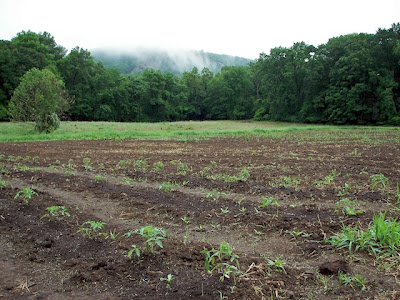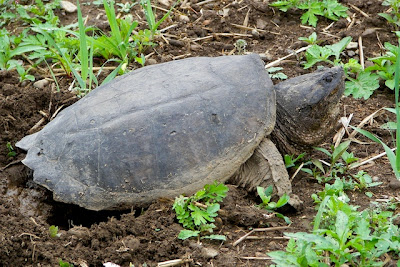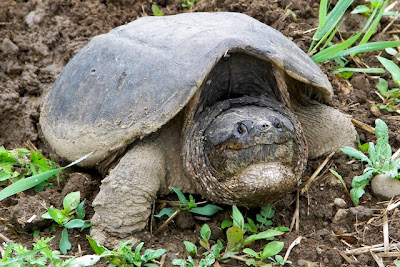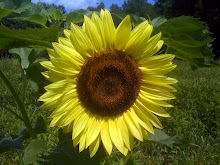Friday, June 27, 2008
Couscous with Asparagus, Snow (or Snap) Peas and Radishes (Serves 6)
Here's a recipe that uses three vegetables from this week's harvest (of course you can substitute at will as vegetables come in and out of season). I was wondering what to do with radishes since I really don't like to just snack on them anymore--they are too spicy. I found the following recipe in Vegetarian Times May/June 2007 that makes uses of those hot hot radishes, the snap peas, and parsley.
Couscous with Asparagus, Snow (or Snap) Peas and Radishes (Serves 6)
1/2 lb. asparagus, sliced into 1/4 inch rounds (about 1 3/4 cups)
1/4 lb. snow peas, sliced crosswise into 1/4 inch strips (about 1 cup)
2 cups low-sodium vegetable broth
3 2inch strips lemon zest
1 10 oz pakg. couscous
3 radishes (about 1/3 cup)
2 T lemon juice (note T =tablespoon and t= teaspoon)
2T chopped parsley
2 T chopped chives
1 T chopped mint
1. Cook asparagus and snow peas in large pot of boiling salted water 2-3 minutes or until crsip-tender. Drain and rinse under cold water
2. Bring broth and lemon zest to a boil in large pot. Put couscous in bowl, and stir in broth. Cover, and let stand 10 minutes. Discard lemon zest.
3. Fluff couscous with fork, and stir in asparagus, snow peas, radishes, lemon juices, chives, parsely and mint. Season with salt and pepper.
Wednesday, June 25, 2008
Living among the crops... and weeds!
Probably because it's been so wet during the past couple weeks, this extremely young american toad frog was found hopping around the carrot bed. I (Pedro) later found what could very well be one of his parents hanging around the summer squash:
Jack also found a fawn sleeping right under the fence when he was baiting it. Not to mention the bear that chased us out of the field last week. Ok, that was a joke.
Monday, June 23, 2008
Turnip Recipe from Katie
I would like to echo everything Tamara said. This is my second year as a CSA member. I love discovering vegetables that I would never buy in a grocery store and learning how to cook them. I don't think I'd ever bought turnip in my life, until last year I found myself looking at a whole bag of them from the CSA. I had no idea what to do with them. So, I turned to my trusty meatless Italian cookbook, and found a recipe that is really fabulous (what isn't good with garlic and olive oil?) Since it's turnip season, I want to share it with you.
Katie
Rape Bianche/ White Turnips
from Carnevale Italiano, The Romagnolis’ Meatless Cookbook (p.222)
1 ½ to 2 lbs small white turnips
2 quarts water
3 teaspoons salt
2 garlic cloves
3 Tablespoons olive oil
3 Tablespoons chopped fresh parsley
Freshly ground pepper
2 Tablespoons chopped turnip greens (optional)
Peel the turnips. Washing and saving the leafy tops (if any, and cut into wedges).
Cook the cut-up turnips in the boiling salted water 10 minutes or until just tender. Drain well.
Sauté the garlic in the olive oil in a large frying pan until golden and then discard the cloves. Add the drained turnips, the chopped parsley, and abundant pepper. If your turnips come with greens, chop the tops and add to the turnips with the parsley. Sauté over high hear 5 to 10 minutes or until the turnip wedges are lightly browned around the edges. Serve hot. For 6.
My adaptation: I tend to be a lazy and forgetful cook. When I did this off the top of my head the other day, I simply sliced the turnips very thin, and tossed them in the pan with the garlic in the olive oil. When they were starting to brown, I tossed in the chopped up turnip tops. I skipped the boiling water and the parsley, and thought it came out just great. I added this to my salad. It would also be great as a side dish or tossed with small shaped pasta.
Sunday, June 22, 2008
Volunteer submission
"Hi! I'm Tamara, and I work on Wednesday mornings at Sun Valley CSA as a volunteer for almost 2 months. I wanted to share with all the members what an enriching experience it has been, not only using my own hands and body to create nutritious food for my family and yours, but also recapturing the lost art of small farming...not to mention wonderful conversation with 2 really interesting dudes!
Each time I visit, I learn something new about farming...
(1) food losses are expected as a part of the process, and they are addressed by over-planting, re-planting, deterring pests, weeding, etc.
(2) obtaining variety for members during the season takes careful planning and knowledge of plant varieties. For example, we have 3 varieties of corn; each one matures at different times. This way we will receive corn shares for a longer period of time than if there was one variety.
(3) every farm has it's own flavor of challenges and blessings. Our farm is challenged with extensive weeds, insects and some deer problems. But the benefits of our field is that it has plenty of moisture because of the location near the river. There is no "perfect" farm, however. Farming is an art of working around (or with) whatever nature hands you.
(4) being a CSA member requires a lifestyle shift, and it is worth it because we are contributing to a higher cause. We have all gotten spoiled by the variety available in grocery stores. We get used to eating our "favorite" foods because they are always available. But people have not always eaten in this luxurious way. They used to "eat off the land," shifting recipes and kitchen activities according to what nature provided them. This is what you will have to do while you are receiving shares of veggies this summer/fall. It might mean helping each other by sharing recipes or food preservation methods. But it is well worth the effort. We are helping to drive society away from the wasteful transport of produce across the world, and short-cut big-agricultural practices like pesticide use and irradiation. Not to mention, we are getting our produce directly off the local land, when it is freshest and full of nutrients.
(5) dirt, bugs, and deformities should be welcome surprises in our weekly baskets—it’s a sign of “organic!” We are used to “perfect” and clean produce, but this is an un-natural expectation developed by big business and unethical farming practices.
(6) farming is HARD WORK for our farmers, for little reward. They are there almost every day, for long days, whether it is raining, sunshine, or scorching heat. And if you do the calculations, you will realize that your share price contributes to our farmers breaking even at best. No profit; probably loss, in fact. This is a labor of love, not money.
Bottom line, I'm extremely grateful for the opportunity to volunteer on our CSA farm, engage with our farmers, and help to produce this year's crop. I find it peaceful, interesting, and a nice break from "the grind" to get my hands in the dirt and enjoy some stimulating conversation along the way. It's also nice to see for myself that our CSA is "real," and learn what to realistically expect as the season unfolds. I hope you, too, will join us in the effort—even if only once—to obtain some of the wonderful benefits that I’ve found. Plus, it would just be cool to meet you!
Here’s to a bountiful harvest for us all!
-Tamara"
Thanks to Tamara for sending this in!
Tuesday, June 17, 2008
Parsley Recipe
1/4 cup olive oil
1/4 cup chopped parsley
4 cloves of garlic, minced
1/2 lb cooked pasta (spaghetti and penne both work great)
Cook the pasta, drain. Drop a tablespoon or two of olive oil on the pasta and stir, this is very important and will prevent the garlic from burning and turning bitter. Heat the remaining olive oil over medium heat. Saute garlic until you see the smaller bits browning, then turn off the heat immediatly, add parsley and stir quickly to keep garlic from burning. Toss pasta with the mixture and stir. Season with salt and black pepper. I like to lightly sprinkle it with parmesan cheese. Makes 2 servings.
Friday, June 13, 2008
First harvest
*Pickup time will be on from 3PM to 6PM.
Please bring a grocery bag either reusable or plastic to pick up your veggies. It looks like our first harvest, albeit modest, will be lettuce, turnips, radishes, snap peas and parsley.
If you are not familiar where the farm is located, click on "About the Farm" located on the right side of the blog. There is a good map and we are located on Bear Swamp Rd in Mahwah. There will be signs on Bear Swamp Rd. on the days of harvest.
Thanks for your support!
Wednesday, June 4, 2008
Early June update
We've had a few challenges in the past couple weeks, mostly related to deer damage and bugs. One deer got in a couple weeks ago and mowed down one of our beds. We have been baiting the fence and doing everything we can to discourage deer from coming in. One deer seems to come in once a week but the damage so far has been minimal.
The farm seems to have an extra healthy population of cucumber beetles and flea beetles; both considered "pests". While they may have slowed down some crops, we are on top of it and proceeded to replant as soon as we noticed any damage.
Two crops have been affected. The deer went after the swiss chard, and the cucumber and flea beetles went after the cucumber. Both crops have been replanted and the damage should only delay these two crops.
Everything else is doing quite well. We will make a decision by next Friday (June 13th) on whether the first harvest will be on the 17th or 24th.
Meanwhile, a couple of snapping turtles visited the field today and laid eggs. Enjoy the pictures!








.jpg)